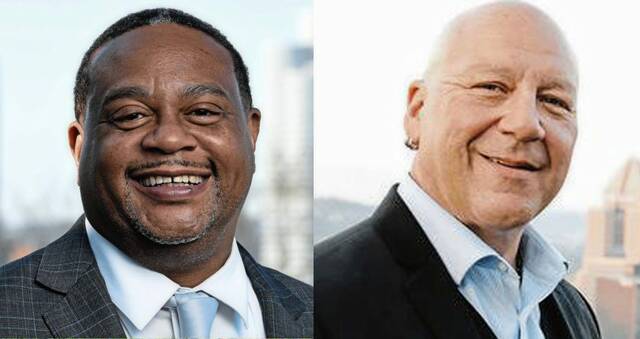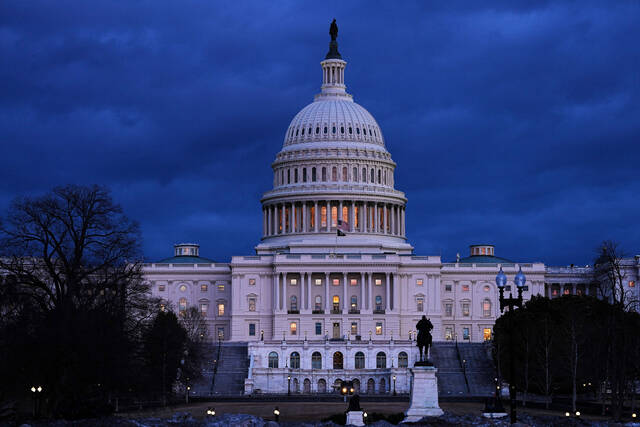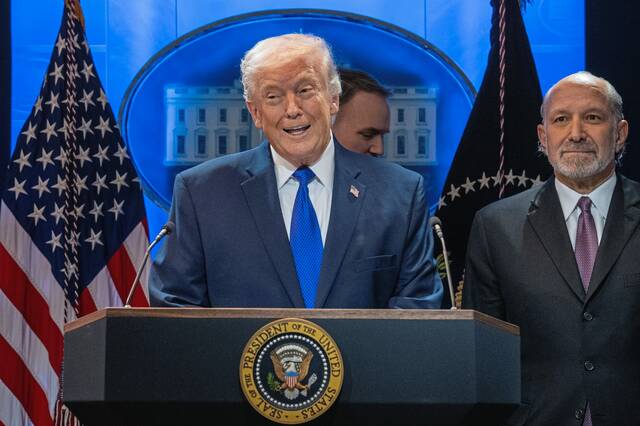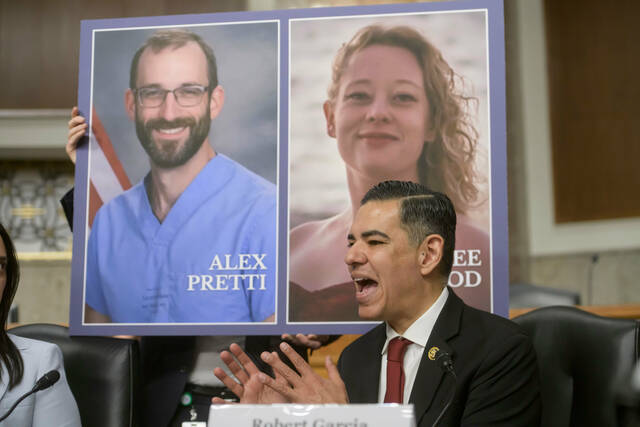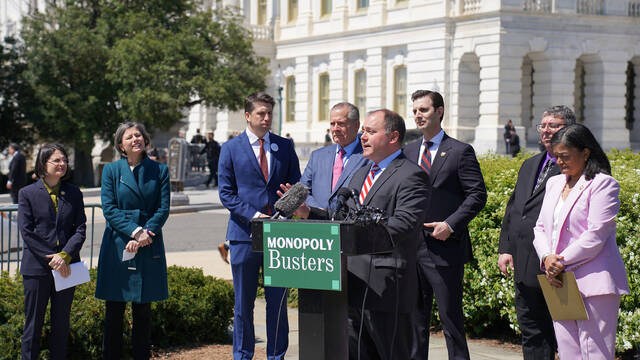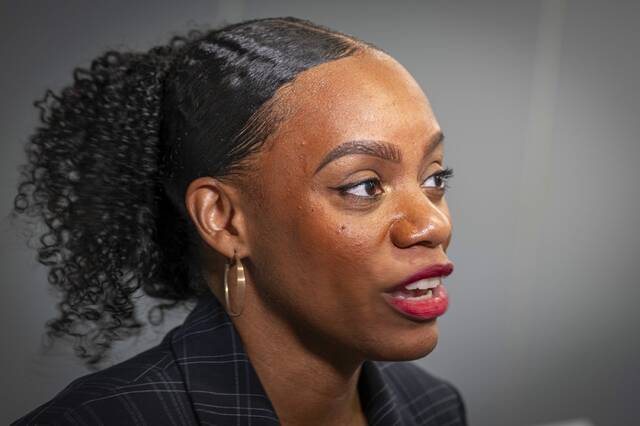In a wide-ranging debate that lasted nearly three hours, mayoral candidates Ed Gainey, a state representative, and Tony Moreno, a retired Pittsburgh police officer, delved into topics ranging from housing and the economy to the environment and voter identification.
If elected, Gainey would become the city’s first Black mayor. Moreno would become the first Republican nominee elected to the post since the 1930s.
“I believe Pittsburgh is primed for change,” Gainey, the Democratic nominee, said during his opening remarks, adding that he wanted to make the city safer, cleaner and more affordable for everyone.
Moreno, running as a Republican after losing the Democratic primary, painted his opponent as part of the city’s existing problems rather than as someone who could help solve them. Moreno said he’s running for office because “my city’s broken” after elected officials have failed to represent the people and “the politics of the day do not work.”
Both agreed that a shortage of affordable housing was among the top issues to tackle, though their views on how to handle the housing crisis differed.
“Housing right now is at a premium,” Gainey said, adding that his administration would be “laser-focused” on establishing more affordable housing.
“We have had an explosive growth in this city that has gentrified neighborhoods, because we didn’t invest in affordability,” Gainey said.
He proposed remedying the problem with inclusionary zoning, which would ensure “all projects that come before us have affordability embedded into it.”
Moreno accused Gainey of “intentionally coming out and gentrifying” the city, citing a 2013 interview in which Gainey touted his involvement in an East Liberty project that is often cited as an example of gentrification in the city.
“He’s campaigning and telling you to stop what he already did,” Moreno said.
Moreno instead suggested finding people in the community, training them in the communities where they live and encouraging them to revitalize the homes and buildings already there. Then, people who live in the community can move into affordable homes that were revitalized there by local workers, he said.
The two also were divided on whether they would extend the eviction moratorium, which was intended to help keep people in their homes throughout the covid-19 pandemic, when many were unable to work.
Moreno said he would eliminate the moratorium, instead focusing on helping people who lost their jobs regain employment so they can pay their bills. The moratorium, he said, hurt landlords who relied on that income, since not all of them are “billionaire landlords.”
Gainey, however, favored keeping the moratorium in place as part of his emphasis on making sure housing was available to everyone.
He also recommended using land available through the city’s land bank for affordable housing, while also designating some of that land for urban gardens and green space.
Moreno argued that, if affordable housing is the main problem, all the land bank’s resources should be directed toward solving that issue.
The candidates also tackled the topic of the environment, a subject that has been highly emphasized under Mayor Bill Peduto’s administration.
“The more that we move towards green, clean jobs, the better our economy’s going to be,” Gainey said.
He pushed for renewable energy sources, emphasized the importance of clean water and air and encouraged accelerating the process of removing lead water lines, some of which are more than 100 years old. Gainey also promised not to privatize PWSA, saying that other parts of the country have seen rates “increase dramatically” after privatizing utility companies.
“We see climate action every day. Let’s make it personal. We see it in our homes,” he said, using flooded basements as an example.
In regards to the environment, Moreno also highlighted the importance of clean water and air, with special emphasis on using the city’s well-known rivers as an energy source.
But he said people should focus on tackling environmental issues within the city, rather than pointing fingers.
“To blame fracking in Beaver County for what’s happening here is the wrong thing to do,” he said, blaming traffic for being a major cause of pollution in the city.
Moreno said he would work to fill positions on PWSA’s board and other city boards with people who were qualified to do the job, rather than politicizing the process by appointing political friends, something he suggested current officials do.
“We have professionals here that are experts at what they do right in the City of Pittsburgh,” Moreno said, suggesting that they shouldn’t continue to outsource to other cities to fill roles that could be better handled by locals who understand the community. “We’re not looking internally to find our best and brightest to grow Pittsburgh in every corner we can.”
Gainey said filling such appointments is “a great opportunity to engage in the community” and seek their recommendations.
Both said they felt everyone should have access to jobs to bolster the local economy and get people back on their feet after the covid-19 pandemic.
They briefly discussed policing, an area where the candidates hold starkly different views.
“We have to change the mindset. We don’t need a military-style police force. Who are we at war with? We’re not at war with our neighbors,” Gainey said, calling for “some systematic changes” and more social workers who could be called in to “deescalate situations.”
But Moreno argued that “reimagining the police force,” as Gainey suggested, “falls in line with redesignating funds or defunding the police.”
He highlighted that Pittsburgh’s police officers receive mental health training and are equipped to handle all kinds of situations. The retired police officer blamed the city’s administration for any shortcomings in the police department, emphasizing that officers themselves believe in “justice and benevolence.”
They were equally split on the topic of voter identification, with Moreno supporting the measure as a way to protect the voting rights he fought for in the military. He suggested having the city government pay for IDs for everyone on their 18th birthday.
The notion that people of color and other minorities may be barred from voting because of voter identification laws is “just ridiculous” and “insulting,” he said.
Gainey, however, argued against voter identification and said he instead advocates for bolstering voter participation.
Moreno also argued against City Council’s recent measures to bolster its own power, calling it a “power grab.” He said he didn’t believe the efforts would be successful.


